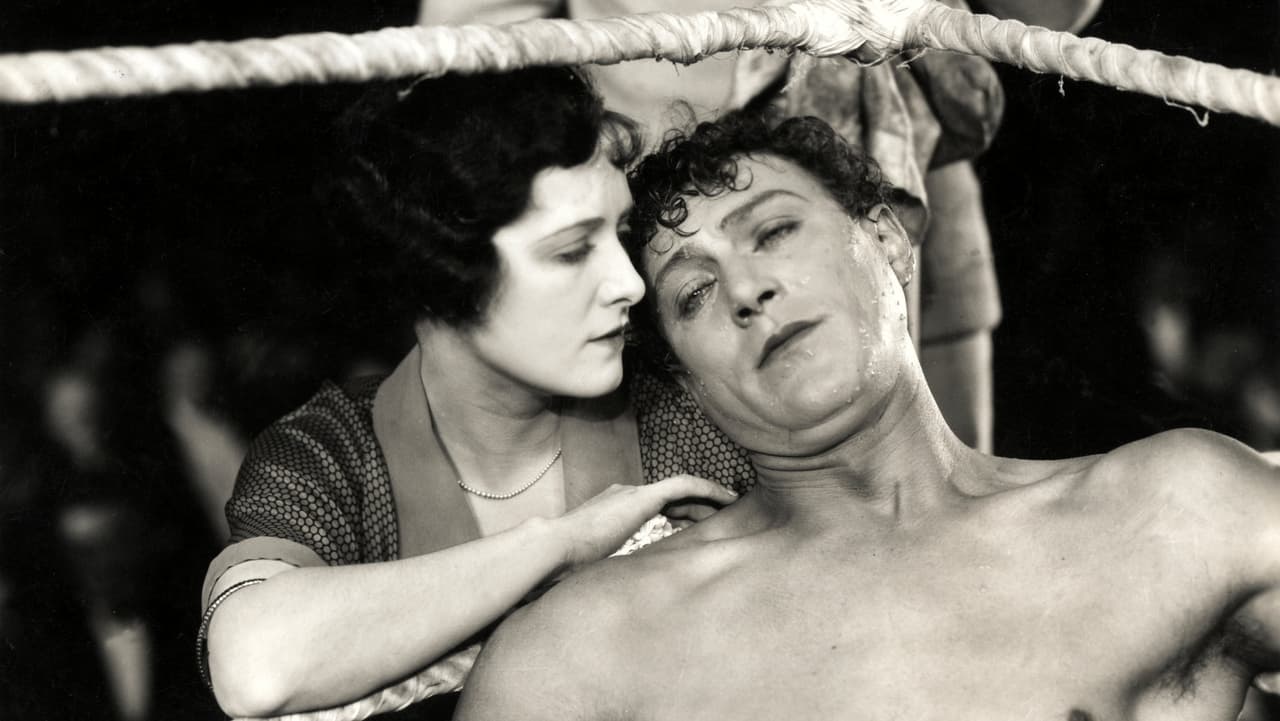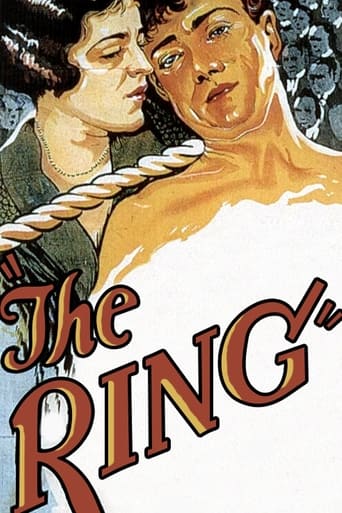

Early Alfred Hitchcock film about a boxer fighting to work his way up to a championship match after the champion steals the guy's wife. Interesting in a number of ways, not least of which are some early hints of Hitch's later brilliance. There are some cool visuals and choices that he makes that show what a talented director he was becoming. Still learning but getting better with every film. Ian Hunter is great as the cocky boxing champion on the prowl to make a conquest of another man's wife. It helps that this is a silent and we can't hear Hunter's distinctive voice. I can't imagine him playing this kind of part during his Hollywood years. Carl Brisson does a tremendous job making you feel for his character. Lillian Hall-Davis is probably the weakest part of the cast but her character isn't the most well-written or likable, so maybe not all the blame rests on her performance.It's a good film, although not for all tastes. The romance is a tough sell, as is usually the case with love triangle stories. It's pretty straightforward and the basic theme is kind of timeless, even if the way in which its presented may seem dated to some viewers today. The fight scenes are exciting and, as with most Hitchcock silents, it's a very attractive-looking film. Also worth a look for some behind-the-scenes window-into-the-past stuff about early 20th century prizefighting in England.
... View MoreHitchcock's THE RING is merely a competently directed silent drama. The only distinguishing marks are in the abundant editing techniques, which is odd since the film's scene editing itself is often severely lacking in competence. Many of the scenes drag and run far too long, resulting in a lack of tension or interest. It could have been shortened easily by fifteen minutes to tighten the plot.It is basically a boxing story with a love triangle at its center. Sparring partners, one a champion, one a want to be, vie for the love of the aspirant's wife. The set-up at an amusement park and the first fight scene last for 18 minutes, far too long with very repetitious sequences. It is odd that both men have names, Jack and Bob, but the woman is known only as The Girl and is never given or referred to by a proper first name.The triangular situation goes on for two thirds of the film, before the husband finally confronts his wife at 1:05:00. The final fight itself is finally superbly shot and edited, lasting from an hour and 16 minutes to the conclusion at an hour and 29 minutes. It is said Scorcese found this sequence helpful in designing his Raging Bull. Finally, real suspense enters the film and lasts all to shortly.There are a number of close-ups, lapse dissolves, montages and superimpositions. A number of these are as follows: the opening amusement park, using close-up reactions and a hand- held camera to indicate giddiness; Jack with super-imposed heads of former rivals; an excellent lapse dissolve of Jack taking Bob's agent's hand in a handshake to Bob slipping a bracelet on the arm of Jack's wife; the wedding when Jack slips the ring on her finger and the bracelet gift slips down her arm into the frame; blurring of the hand-held camera to indicate drunkenness at the party; Bob's face on Jack's punching bag; dissolves of the fighting schedule with Jack moving farther up the competition; a montage of jazz age images with Bob kissing Jack's wife superimposed on a close-up of Jack.Gordon Harker is excellent as the promoter. He appeared in three of Hitchcock's silents. (In fact Hitch used to like to re-use people: Hall-Davis is in two; Brisson in two; Ivor Novello in two; and Hunter in two). Hall-Davis is as sweet here as she was in The Farmer's Wife, too sweet to be convincing as the two-timing wife. Hunter is merely adequate.Brisson is excellent, as he was in The Manxman. His career was a short one – only 13 films. A handsome and expressive leading man.So, in total, cinematography and editing techniques are the stars here, rather than the story line, narrative or dramatic scene construction. A good film, but in no way special as silent drama.
... View MoreThe story of "The Ring" I personally found boring for most of the film. A love triangle: one woman and two boxers that end up duking it out over her. She was rather bored in her marriage as I was bored with this film. It surprises me that the story was rather a snore because Alfred Hitchcock not only directed it but wrote it.There are a couple of scenes I got a giggle out of and a really dramatic scene about an hour into it - good scenes when the husband has found out about his wife cheating and he confronts her, ripping off the shoulder of her dress revealing her slip top and then he grabs and rips off the upper arm bracelet that she is concealing that her lover gave her. Then the husband goes out to find the man.What is good about the film is the cinematography and editing - it's a great early Hitchcock directing piece.3/10
... View MoreIan Hunter was later to be King Richard the Lionheart in Errol Flynn's "The Adventures of Robin Hood." Here, he's the heavyweight champion. Just for the heck of it, and because he was taunted by the girl (Hall Davis) who takes tickets, he gets into the ring with "One Round" Jack (Brisson), a carnival nobody who makes a meager living fighting all comers. The ticket-taking young lady is Brisson's girl friend.Hunter decks Brisson, as is expected, but the bout forms a certain bond between them. Hunter's win also attracts the attention of Hall Davis. Gee, a genuine champion! Hunter slips her a bracelet bought with his winnings from the bout.Brisson then finds a manager and begins professional boxing. He marries Hall Davis in a comic scene. Hitchcock handles the scene with some deftness. An insert shows us Brisson's hand slipping the wedding ring onto Hall Davis's finger, but the bracelet from Hunter slides down her arm and confuses the simple event.Brisson works his way up to the top and finally wins the match that will get him a title shot against Hunter. He returns home to find his pals ready to celebrate with him -- but no wife. She's out schtupping Hunter. The champagne goes flat while everyone waits for her return. One by one, the Brisson's glum buddies take their leave. Brisson has by the time caught on to the situation. When Hall Davis finally returns there is an angry exchange and Hall Davis leaves him, feeling insulted.The night of the big fight arrives and it's exhausting. Brisson takes a pounding from Hunter. Just when it seems he can't get through another round, guess what happens. Hall Davis arrives, changes her mind, and rushes to Brisson to tell him, "I'm in YOUR corner, Jack!" That signal Hunter's KO. Happy ending.It's a bit slow and torpid at the start but after twenty minutes or so, I found myself caring what happened to the characters. They're pretty well written. Hunter isn't an evil guy, just careless about the feelings of others and used to having any girl he has a yen for. Brisson is the obvious and oblivious protagonist, good natured, committed, naive. Hall Davis is flighty and adulterous but turns out all right in the end.Hitchcock plays some tricks with the camera and seems to enjoy experimenting with the device. We see the world hazy and shimmering through the eyes of a drunken man. It's even worse when we get the POV of Brisson after he's been skinned alive in the ring. One of the camera's capers is unusual. At the bottom of the screen a man's hands are playing the keys of a piano, but the keys extend blurrily all the way up to the top of the screen.It's not a great movie. Love triangles are common and the end is formulaic. Nor is the acting outstanding. I'm not sure what would constitute an outstanding performance in a silent movie, disregarding makeup.You'll probably stay awake through it, but it's not worth repeated viewings.
... View More